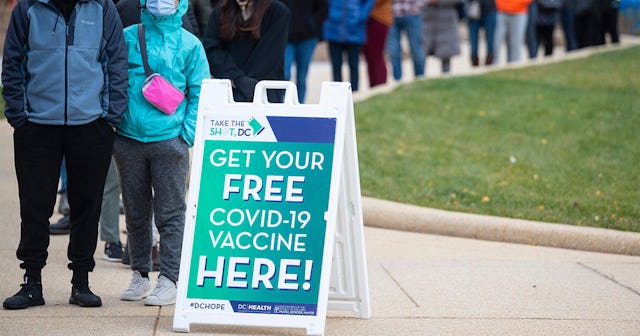Omicron Variant Now Accounts For 70% Of U.S. COVID Cases

The omicron variant of COVID-19 is spreading rapidly in the U.S., and now accounts for nearly 3/4 of all new cases, according to the CDC
As the U.S. faces the holiday season amid absolute uncertainty as a new COVID-19 variant spreads around the globe, the Centers for Disease Control and Prevention reports that the new variant, omicron, is already spreading rapidly in most of the country. During the week from Dec. 12 to Dec. 18, the omicron variant accounted for 73.2 percent of new COVID cases, up from just 12 percent of cases the week prior.
The delta variant, which has been causing cases to surge all over the country since last summer, accounted for another 26.6 percent of cases this week, according to CDC data.
What’s terrifying about omicron is how quickly it’s become the dominant strain in the U.S. In some parts of the country, including the Pacific Northwest and the northeast (especially New York), the variant now makes up more than 90 percent of new cases.
But omicron also feels extra scary because there’s so much we still don’t know about the variant. It was discovered in southern Africa just last month, and has since spread to nearly every country on the globe. The variant contains more than 30 mutations, some of which seem to help it evade immunity — both from prior COVID infections and from vaccination. Additionally, omicron is by far the most contagious version of the coronavirus we’ve encountered so far — its rapid spread makes it the most contagious pathogen ever seen on Earth.
Scientists have seen early indications that omicron might be less deadly (and cause less severe disease) than other COVID-19 variants, but it’s still too soon to know that for sure. There’s also promising evidence that getting a booster shot on top of being fully vaccinated can help ward off infection and severe disease if you’re exposed to omicron. A large study out of South Africa showed that in vaccinated people, omicron tends to be mild, consisting of a scratchy throat, nasal congestion, and body aches that typically resolved within a few days.
What does this new variant mean for holiday travel and plans? Experts are urging people to be cautious and President Biden is sending out 500 million at-home tests. If you’re traveling, wear a high-quality mask in crowded places (like airports) and don’t take it off if you can avoid it, even to eat or drink. Experts also recommend testing frequently, including with at-home antigen tests, which can be found at many drugstores, grocery stores, and pharmacies. If you test positive for the virus, isolate for at least 10 days.